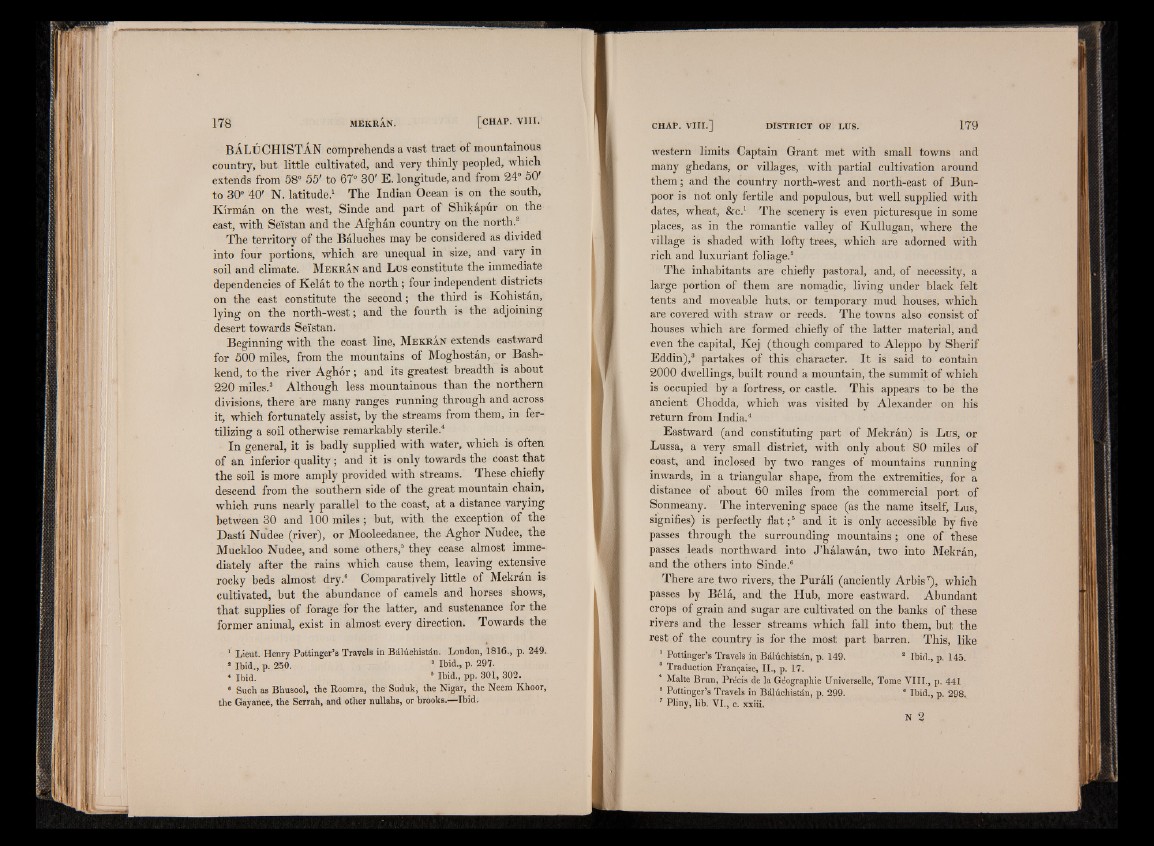
BALUCHISTAN comprehends a vast tract of mountainous
country, but little cultivated, and very thinly peopled, which
extends from 58° 55' to 67° 30' E. longitude, and from 24° 50'
to 30° 40' N. latitude.1 The Indian Ocean is on the south,
Kirman on the west, Sinde and part of Shikapur on the
east, with Seistan and the Afghan country on the north.2
The territory of the Baluches may he considered as divided
into four portions, which are unequal in size, and vary in
soil and climate. Mekran and Lus constitute the immediate
dependencies of Kelat to the north; four independent districts
on the east constitute the second; the third is Kohistan,
lying on the north-west; and the fourth is the adjoining
desert towards Seistan.
Beginning with the coast line, Mekran extends eastward
for 500 miles, from the mountains of Moghostan, or Bash-
kend, to the river Aghor; and its greatest breadth is about
220 miles.3 Although less mountainous than the northern
divisions, there are many ranges running through and across
it, which fortunately assist, by the streams from them, in fertilizing
a soil otherwise remarkably sterile.4
In general, it is badly supplied with water, which is often
of an inferior quality; and it is only towards the coast that
the soil is more amply provided with streams. These chiefly
descend from the southern side of the great mountain chain,
which runs nearly parallel to the coast, at a distance.varying
between 30 and 100 miles ; but, with the exception of the
Dasti Nudee (river), or Mooleedanee, the Aghor Nudee, the
Muckloo Nudee, and some others,5 they cease almost immediately
after the rains which cause them, leaving extensive
rocky beds almost dry.6 Comparatively little of Mekran is
cultivated, but the abundance of camels and horses shows,
that supplies of forage for the latter, and sustenance for the
former animal, exist in almost every direction. Towards the
1 Lieut. Henry Pottinger’s Travels in Bdluchistdn. London, 1816., p. 249.
* Ibid., p. 250. 8 Ibid., p. 297.
‘ Ibid. 8 Ibid., pp. 301, 302.
• Such as Bhusool, the Roomra, the Suduk, the Nigar, the Neem Khoor,
the Gayanee, the Serrah, and other nullahs, or brooks.—Ibid.
western limits Captain Grant met with small towns and
many ghedans, or villages, with partial cultivation around
them; and the country north-west and north-east of Bun-
poor is not only fertile and populous, but well supplied with
dates, wheat, &C.1 The scenery is even picturesque in some
places, as in the romantic valley of Kullugan, where the
village is shaded with lofty trees, which are adorned with
rich and luxuriant foliage.2
The inhabitants are chiefly pastoral, and, of necessity, a
large portion of them are nomadic, living under black felt
tents and moveable huts, or temporary mud houses, which
are covered with straw or reeds. The towns also consist of
houses which are formed chiefly of the latter material, and
even the capital, Kej (though compared to Aleppo by Sherif
Eddin),3 partakes of this character. It is said to contain
2000 dwellings, built round a mountain, the summit of which
is occupied by a fortress, or castle. This appears to be the
ancient Chodda, which was visited by Alexander on his
return from India.4
Eastward (and constituting part of Mekran) is Lus, or
Lussa, a very small district, with only about 80 miles of
coast, and inclosed by two ranges of mountains running
inwards, in a triangular shape, from the extremities, for a
distance of about 60 miles from the commercial port of
Sonmeany. The intervening space (as the name itself, Lus,
signifies) is perfectly flat ;5 and it is only accessible by five
passes through the surrounding mountains ; one of these
passes leads northward into J’hâlawân, two into Mekran,
and the others into Sinde.6
There are. two rivers, the Purâli (anciently Arbis7), which
passes by Béla, and the Hub, more eastward. Abundant
crops of grain and sugar are cultivated on the banks of these
rivers and the lesser streams which fall into them, but the
rest of the country is for the most part barren. This, like
1 Pottinger’s Travels in Bdhichistân, p. 149. 8 Ibid., p. 145.
8 Traduction Française, II., p. 17.
Malte Brun, Précis de la Géographie Universelle, Tome VIII., p. 441
8 Pottinger’s Travels in Bàlûchistân, p. 299. 8 Ibid., p. 298,
r Pliny, lib. VI., c. xxiii.